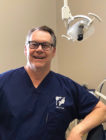“Alexa, give me the number of new patients in January 2022.”
“Siri, play my patient’s favourite music.”
“Hey Google, tell my patients some jokes.”
“Alexa, start the timer for the dental sterilizer.”
Who are these people that we always speak to? I suppose “who” is not the right word, but rather “what”. These are all forms of artificial intelligence (AI) that have become not only a staple in many people’s homes, but also in their workplaces for a variety of personal and professional applications. AI will likely be integral in the future of medical and dental specialties. These technologies will be capable of changing many aspects of healthcare, as well as the administrative structures within hospitals, dental offices and insurance payers. AI is a statistical method of data analysis that automates analytical modeling. It learns from training models in which the outcome variable is known.
While AI often conjures up gleaming robots interacting with humans such as those seen on the big screen like “I, Robot” (Will Smith), “Ex Machina” (Alicia Vikander) or “Finch” (Tom Hanks), the reality is far less dramatic. AI uses computers to analyze large data sets to find patterns to develop predictive models and algorithms. These predictive models will assist healthcare providers to achieve better treatment outcomes. For example, AI can analyze thousands of X-rays simultaneously, assisting with caries diagnosis, patients at risk of oral cancer, prediction of post-extraction complications and orthognathic surgery planning, as just a few clinical examples.
AI will be instrumental in the administrative aspects of the dental office. It will assist with front office task prioritization, improving diagnostic capabilities/storage and processing insurance claims or adjudication. The upside of AI is that it is a powerful tool that will only increase efficiency. It’s like adding a virtual employee that can think and analyze faster than humanly possible. This is a powerful ally at the front desk.
AI has developed rapidly in the recent years and will become a normal tool in the dental office. We can only anticipate that while we continue to increase the use of various forms of AI, improvements will be made in the delivery of optimum dental care and treatment options for patients. AI will also be a very useful tool in running a practice.
And while we can’t deny the benefits of AI, in this humble dentist’s opinion, it will never replace well-seasoned front desk staff, a multi-tasking team member or a talented dental assistant. A machine won’t anticipate the needs of your practice as well as human intuition. A machine won’t calm a patient’s nerves as well as a soothing human voice can. A machine won’t be there to bounce ideas off or offer opinions. Artificial intelligence will never be superior to capable staff – well at least not in my practice lifetime!
About the Author
 Bruce Pynn is Oral Health’s editorial board member for Oral and Maxillofacial Surgery. He maintains a private practice in Thunder Bay, ON. He is an Assistant Professor, North Ontario School of Medicine, Lakehead University, and Chief of Dentistry, Thunder Bay Regional Health Sciences Centre. He is also the Past President of the Ontario Society of Oral and Maxillofacial Surgery.
Bruce Pynn is Oral Health’s editorial board member for Oral and Maxillofacial Surgery. He maintains a private practice in Thunder Bay, ON. He is an Assistant Professor, North Ontario School of Medicine, Lakehead University, and Chief of Dentistry, Thunder Bay Regional Health Sciences Centre. He is also the Past President of the Ontario Society of Oral and Maxillofacial Surgery.












